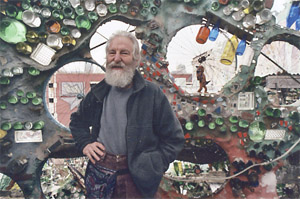
For 15 years, Zagar has been plastering South Street and the surrounding neighborhood with Cubist-style mosaics reminiscent of Picasso and creeping installations reminding passers-by of uninhibited roadside Americana. There are now 80 or 90 works and counting. He calls them "folk environments" and "manifestations of myself," and says he's made it his life's work "making the city of Philadelphia, PA, USA into a labyrinthine mosaic museum."
If Peru RPCV Isaiah Zagar had his way, every surface of his own gritty neighborhood in South Philly would be paved with slivers of mirror, shards of pottery and broken tiles
Rebuilding South Philly, piece by piece
By John and Sally Macdonald
Special to The Seattle Times
PHILADELPHIA — If Isaiah Zagar had his way, paradise (and every surface of his own gritty neighborhood in South Philly) would be paved with slivers of mirror, shards of pottery and broken tiles.
Stroll almost any street in the neighborhood and you'll come across samples of Zagar's strange and sometimes moving artistic vision: mosaics created with glass and tile plastered onto brick walls or automatic garage doors, and "garden" installations made of found stuff and cement that creep over cyclone fences along city sidewalks.
The neighborhood is undergoing a renewal and many of the young professionals moving in see Zagar's art — unconventional as it is — as fitting right in.
Zagar shrugs off the changes. He's seen the neighborhood at its worst, when its crumbling buildings were just a different kind of canvas waiting to be "embellished" by a struggling artist trying to find his aesthetic voice.
"The neighborhood has been a matrix for my work, because of its failure in a way," he says. "Each generation has its chance to modify a city to its needs and dreams. It's called gentrification, but really it's people re-thinking and re-dreaming a city."
Philadelphia prides itself on being the seat of American history. In summer, street corners bustle with storytellers and park rangers, eager to take visitors on a founding-fathers tour.
If you go
South Philly mosaics
Where
Philadelphia is no small city. And with so many of its visitors wanting to see the famous historic sites, it's good that much of that part of the city can be seen on foot.
One old Philadelphia neighborhood is along South Street, where many of Isaiah Zagar's mosaics are scattered between Second and 13th streets.
It's worth taking the extra hour to walk from the downtown area through this South Philly community and the nearby famed Italian Market.
Zagar's "Magic Garden" and his studio are at 1022 South St. The garden is open to visitors from noon-4 p.m. every Saturday and Sunday. The space can be rented for special events.
Zagar's two-day weekend workshops are held from 9 a.m. to 4 p.m., monthly through November, at the studio. For a 2006 schedule, visit www.phillymagicgardens.org.
Information
For general information about visiting Philadelphia, visit www.gophila.com/neighborhoodtours or phone 215-389-TOUR .
The city claims more impressionist art and more Rodin sculptures than any other outside Paris. And, thanks to a program that fosters painting historic scenes on blank walls of old buildings before graffiti artists get to them, the city has 2,400 historic murals to entertain locals and wow tourists.
Then there's Zagar.
You won't find him in the tourist brochures, but his claim to Americana may be as authentic as that of the sidewalk historians. Like the officially sanctioned murals, his slightly renegade mosaic art is free and available to anyone who wanders by.
And his eccentric, ubiquitous art and pithy philosophy have made him something of a luminary.
Zagar, a rumpled man with frazzled gray-white hair and a gentle demeanor, is not without a portfolio — he has a fine-arts degree from the prestigious Pratt Institute in New York.
For 15 years, Zagar has been plastering South Street and the surrounding neighborhood with Cubist-style mosaics reminiscent of Picasso and creeping installations reminding passers-by of uninhibited roadside Americana.
There are now 80 or 90 works and counting.
He calls them "folk environments" and "manifestations of myself," and says he's made it his life's work "making the city of Philadelphia, PA, USA into a labyrinthine mosaic museum."
Reviews from the neighbors have been mixed.
One says Zagar's works have become "beloved icons of South Philadelphia" and "the ultimate in accessible public art." Another, who recently tried to get a garden piece bulldozed, calls it "garbage."
Zagar and his wife Julia live in the leafy, sun-dappled neighborhood where he goes about his art and workshops for budding muralists while she runs a shop, selling folk art from South America. Most of the three-story red-brick row houses were built in the early 1800s to serve a relatively well-off African-American community.
The neighborhood has experienced regular periods of decline followed by rejuvenation. When the Zagars arrived in 1968 after stints in Bolivia and Peru with the Peace Corps, the community and Zagar both were flagging. He suffered a nervous breakdown brought on, he says, by trying to readjust to American life in a time of social turmoil.
"I remember when Martin Luther King was killed," he says. "I couldn't breathe. I felt the air was being let out of the entire world."
There's been an upswing recently, in terms of both the neighborhood and Zagar's place in it. Downtown is within walking distance, and its glassy skyscrapers can be seen occasionally through the trees. A newly built Whole Foods Market takes up one block of South Street, speaking to the community's revival.
Zagar's work reflects his artistic vision, literally and figuratively. One wall beside an old church features a running stream of tiles telling the story of Jesus in Bible verses. The front of one row house, entirely covered in pastel tiles and mirrors, bounces images of the neighborhood back at the viewer and throws rainbows onto the sidewalk.
The Magic Garden, which Zagar calls his "opus," fronts a loft space where he has his workshop. It is an eruption of found stuff — broken pottery, colored bottles, bent bicycle wheels, tin Christmas ornaments, a wooden folk-art angel and more mirrors — made into a maze of free-standing walls and tunnels.
The garden is an ongoing project. Some of the cement along one pathway was still wet one recent weekend when a gaggle of art students arrived to don grout-stained aprons for a Zagar seminar.
It's cool in the early morning, and Zagar wears a Bolivian-style knit cap-of-many-colors, a clashing tie-dye T-shirt and high-water sweat pants over tan twills.
"This is messy work," he muses to no one in particular as he shows the students how to cut mirrors into 1-by-2-inch rectangles. "Remember, you're working with lethal materials here, and I don't want you to get cut."
Most of the 21 students are from Philadelphia or nearby communities. They paid $150 for a two-day workshop, gluing on tiles and smearing tinted grout in the crevices of Zagar's latest commissioned work under his direction.
A few neighbors stop by on their way to the nearby Italian Market to say hello, and a tour bus stops at the corner to let visitors watch the artist in action. He hugs the neighbors and waves at the tourists and urges children passing by to join the paying crowd in putting up a tile or two.
Not every neighbor greets another Zagar mural with enthusiasm.
The owner of the property Zagar has covered with the Magic Garden recently accused the artist of working on the land illegally and gave him a deadline for coming up with $300,000 to buy the property or have his work bulldozed.
The owner was quoted in the Philadelphia Arts Writer, an online culture publication, as saying Zagar's work was "garbage" and the artist "like a guest whom you let come to dinner. And then he never wants to leave."
Zagar says he cleaned up the lot and was allowed to use the land for 10 years without cost. With the help of Philadelphia Lawyers for the Arts, a volunteer organization of attorneys who work pro bono for the arts, he got an injunction to protect the work and is trying to raise $200,000 by November to buy the property. An anonymous angel has promised the other $100,000.
Zagar has raised about $90,000 toward saving the Magic Garden, including $2,000 the Diadones paid for their wall.
Tuition for the seminars goes to buy materials — all of which stay, of course, in the neighborhood.
"You won't take anything home from your effort with me but knowledge," Zagar tells his students. "The skill of cutting a mirror takes about a minute to learn. The skill of putting on a tile may take 20 minutes of great anxiety. But the skill I'm trying to impart is the skill of courage, the courage to make mistakes. And art."
"That's OK. I came for the class and the artist," says Roz Lombardo, who came from Morristown, N.J., to the weekend seminar with her daughter, Gia. They gave each other this experience to celebrate their spring birthdays and to get a close-up look at Zagar and his quirky art.
"I've done a few little things, putting tile on patio- table tops, that sort of thing," Lombardo says. "I wanted to see how to do this on a grand scale.
"Now I can't wait to get home and start on our basement."
Sally Macdonald is a retired Seattle Times reporter; John Macdonald retired as the Times' travel editor.
Copyright © 2006 The Seattle Times Company





















